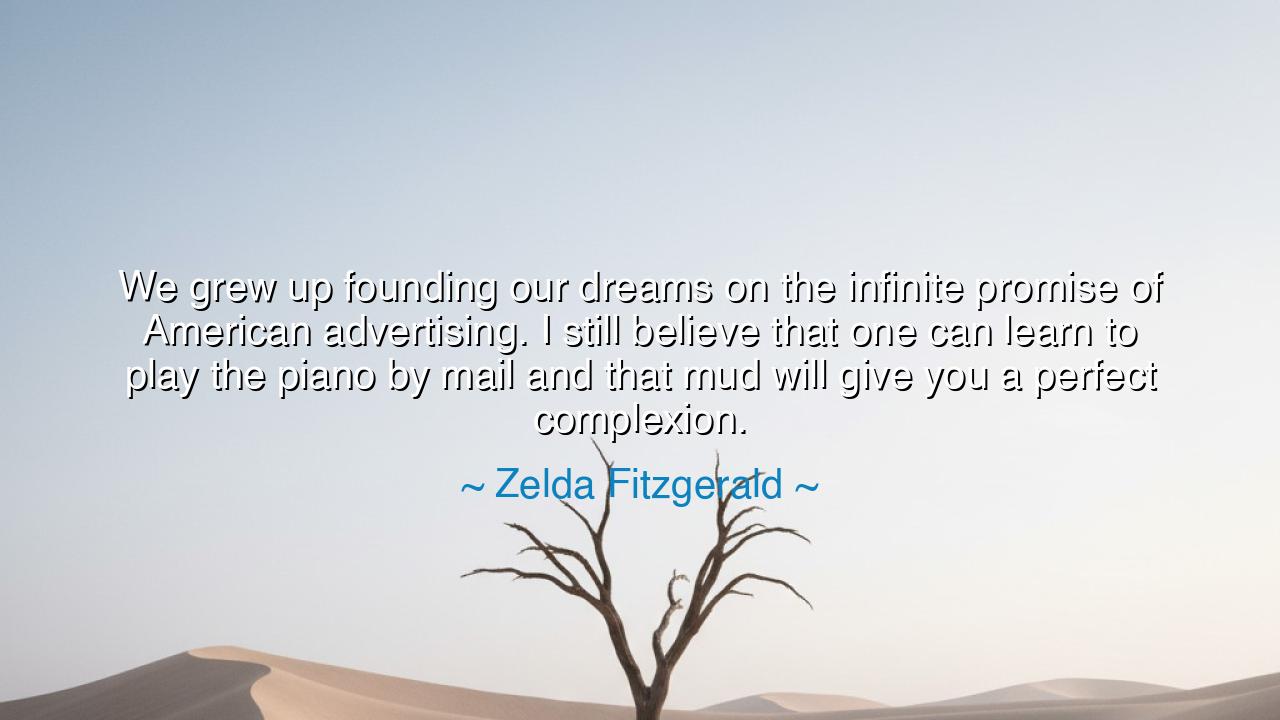
We grew up founding our dreams on the infinite promise of
We grew up founding our dreams on the infinite promise of American advertising. I still believe that one can learn to play the piano by mail and that mud will give you a perfect complexion.






The words of Zelda Fitzgerald, both wistful and piercing, reveal the soul of a generation intoxicated by illusion: “We grew up founding our dreams on the infinite promise of American advertising. I still believe that one can learn to play the piano by mail and that mud will give you a perfect complexion.” In this reflection, she speaks not only for herself but for an entire age—the glittering, restless 1920s—when hope was sold in silver wrappings, and youth mistook desire for destiny. Beneath her wit lies both wonder and lament, for Zelda saw clearly that the promises of modern life—its glamour, its endless novelty—were built upon dreams too fragile to last.
Zelda Fitzgerald, wife of the novelist F. Scott Fitzgerald and a luminous figure of the Jazz Age, lived in a world where art and commerce intertwined, where advertising became the new mythology of the modern age. Her words capture the paradox of that time: a faith in progress so boundless that even fantasy felt achievable. To “learn the piano by mail,” to find beauty in a jar of mud—these were the small absurdities of a culture drunk on optimism, a culture that told every soul they could remake themselves, if only they purchased the right dream. Yet beneath her playful tone lies sorrow, for Zelda herself lived amid that shimmering illusion and was, in many ways, consumed by it.
Her quote speaks to a deeper human truth: that every age constructs its own mirage of fulfillment. The ancients sought immortality in the temples of their gods; the Renaissance sought it in art and reason; the modern world seeks it in consumption. Zelda’s “American advertising” was more than business—it was belief. It promised perfection through products, joy through appearance, worth through wealth. And though she half mocks it, she also admits, “I still believe.” For such promises, however false, appeal to the eternal yearning of the human heart—to be transformed, to be more than what one is. Her faith is both ironic and tragic, for she knows the magic is make-believe, yet she cannot stop herself from believing.
Consider the story of Icarus, who bound wings of wax and feathers to his arms, believing he could touch the sun. His faith in flight was his undoing, yet it was also his glory. So too with Zelda and her generation—they soared on wings of modernity, convinced that technology, money, and beauty could conquer limitation itself. The skyscraper replaced Olympus; the advertisement replaced the oracle. But when the Great Depression came, and the glitter turned to dust, their wings melted in the heat of reality. The same illusions that had lifted them high left them broken when the truth came crashing in. Zelda, caught between her brilliance and her fragility, became both a prophet and a casualty of that fall.
Still, her words carry not only tragedy but insight. She teaches us that illusion and faith are twins, born of the same human longing. To believe that mud could give one perfect beauty is not so different from believing that art can give life meaning. The danger lies not in dreaming, but in mistaking dreams for guarantees. The infinite promise she speaks of is not the evil of her time alone—it is the perennial temptation of humanity: to look outward for salvation when it must come from within. Every generation must learn, as she did, that no advertisement, no possession, no external promise can grant the peace that the soul seeks.
Yet we must not mock her faith. For to dream, even foolishly, is better than to live without wonder. The task, then, is to refine our dreams—to separate the hollow from the holy, the glitter from the gold. We must dare to imagine greatness, but we must anchor that imagination in truth. Like Zelda, we may still “believe” in beauty and transformation, but our belief must be rooted in the work of the spirit, not the illusions of the market. True fulfillment does not arrive by mail, nor from the hands of advertisers, but from the discipline of creation, the courage of honesty, and the patience of self-discovery.
Therefore, O listener, let this teaching take root in your heart: question the promises that come too easily, but do not let cynicism steal your wonder. Dream deeply, but make your dreams real through effort, not purchase. Seek beauty not in the jars of commerce, but in the art of living. Learn the music of life not from instructions mailed from afar, but from your own persistence at the keys. For only by this can you turn illusion into insight, and longing into truth.
And when you gaze upon the bright advertisements of the world—its glittering images, its easy answers—remember Zelda’s bittersweet wisdom: that even false promises reveal what humanity most desires. Use that knowledge to dream better dreams, to build your own meaning, and to find in your own hands the power that no salesman can sell. For the truest perfection, the most lasting beauty, is not learned by mail—it is earned by the living soul.






AAdministratorAdministrator
Welcome, honored guests. Please leave a comment, we will respond soon